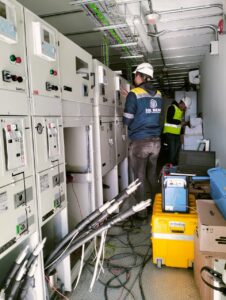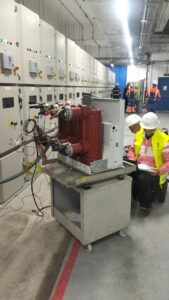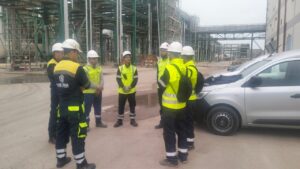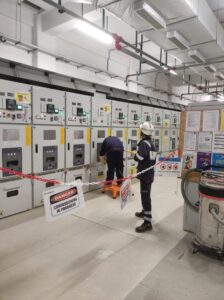In today’s rapidly changing industrial landscape, ensuring that facilities operate efficiently and sustainably is more critical than ever. One of the key components of achieving this balance is an effective Heating, Ventilation, and Air Conditioning (HVAC) system. HVAC systems are at the core of maintaining controlled environments within industrial settings, providing both comfort and operational efficiency. However, as industries aim to reduce their carbon footprint and energy costs, the revolution in HVAC systems has taken center stage, pushing innovation and efficiency to new heights.
The Importance of HVAC in Industrial Projects
HVAC systems play a pivotal role in the overall functionality of industrial environments. Beyond temperature control, they ensure adequate ventilation, maintain air quality, and provide a safe and comfortable working environment. In large-scale operations such as manufacturing plants, power stations, and processing facilities, efficient HVAC systems are essential to ensure that machinery and equipment operate under optimal conditions, reducing the risk of overheating, product spoilage, or unsafe working conditions.
These systems not only protect the physical assets of the facility but also contribute to the health and productivity of the workforce. Yet, traditional HVAC systems have long been associated with high energy consumption and costs, often contributing significantly to a facility’s carbon emissions. This has driven the demand for more energy-efficient, sustainable, and innovative HVAC solutions.
The Shift Toward Energy-Efficient HVAC Solutions
As the global emphasis on sustainability continues to rise, industries are being urged to adopt energy-efficient practices, and HVAC systems are a major focal point. Improving HVAC energy efficiency is key to reducing the operational costs of a facility while simultaneously meeting environmental regulations. Energy-efficient HVAC systems optimize the consumption of energy through advanced technologies, significantly reducing waste and emissions.
For example, incorporating smart thermostats, variable-speed drives, and automated monitoring systems into HVAC designs allows for more precise control of temperature and airflow based on real-time conditions. This ensures that the HVAC systems are only using the amount of energy required at any given time, leading to substantial cost savings and a reduced environmental impact.
SSE MENA’s Expertise in Industrial HVAC Systems
At SSE MENA, we understand the critical nature of HVAC systems in industrial projects. Our team of experts is dedicated to providing comprehensive HVAC solutions that are tailored to meet the unique needs of each facility. Whether it’s designing a new system from the ground up or retrofitting an existing system with energy-efficient upgrades, we ensure that our solutions deliver optimal performance and sustainability.
Our approach integrates the latest energy-efficient technologies, such as heat recovery systems that recycle waste heat and smart controls that allow for seamless automation and monitoring. By focusing on the specific operational needs of each client, we are able to design HVAC systems that not only reduce energy consumption but also improve overall operational efficiency.
Case Study: Enhancing Energy Efficiency in Industrial HVAC
A recent project highlights the impact of SSE MENA’s innovative HVAC solutions in an industrial facility. The client, operating in a high-demand manufacturing environment, was facing excessive energy costs due to outdated and inefficient HVAC systems. SSE MENA conducted a thorough analysis of the facility’s requirements and implemented a customized HVAC solution incorporating advanced energy-efficient components, including high-efficiency air handling units and variable-speed motors.
The result was a significant reduction in energy consumption, with the client experiencing a 30% decrease in their monthly energy bills. In addition to the cost savings, the system’s enhanced performance contributed to a more stable and comfortable working environment for employees, resulting in increased productivity and reduced downtime.
Innovative Technologies Driving HVAC Transformation
The HVAC industry is witnessing a technological revolution, with advancements that offer unprecedented efficiency and control. Among these innovations are geothermal heating and cooling systems, which utilize the earth’s natural heat to regulate temperature, drastically reducing reliance on traditional energy sources. Heat recovery systems are another breakthrough, capturing waste heat generated by industrial processes and reusing it within the HVAC system.
Additionally, green building certifications, such as LEED (Leadership in Energy and Environmental Design), are pushing the integration of HVAC systems with other building components to enhance sustainability. These technologies not only help industries reduce their energy footprint but also ensure compliance with global environmental standards.
SSE MENA is at the forefront of these advancements, continuously integrating the latest technologies into our HVAC designs to ensure that our clients benefit from the highest levels of efficiency and sustainability.
Conclusion: The Future of HVAC in Industrial Projects
The future of HVAC in industrial settings lies in continued innovation and a commitment to energy efficiency. As industries evolve, the demand for HVAC systems that can provide optimal environmental conditions while minimizing energy use will only increase. SSE MENA is committed to leading this charge, offering state-of-the-art HVAC solutions that meet the evolving needs of our clients.
Through our dedication to excellence and sustainability, we continue to revolutionize HVAC systems, ensuring that our clients not only achieve their operational goals but also contribute to a more sustainable and energy-efficient future.





